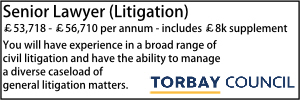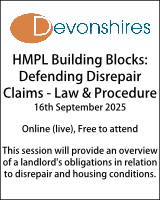High Court issues ruling on costs charged by borough at summons stage of council tax dispute
Surrey Heath Borough Council issued an unlawful council tax summons but this should not be quashed because the complainant failed to exhaust other options before launching a judicial review, the High Court has found.
- Details
Timothy Corner KC, sitting as a deputy High Court judge, also refused to quash the order made against the claimant, a local resident, on the ground that the outcome of the dispute would have been the same had the demand been lawful.
The claimant argued that when Surrey Heath began proceedings to recover unpaid council tax of £280 it should not have added a further £80.50 to this sum for collection costs - based on an average of these - as these related to a liability order which had not at that point been issued.
Surrey Heath argued that it had a lawful and rational basis for charging an average sum for these costs,
The claimant though claimed that at the point of issuing him with a summons to Guildford Magistrates' Court, the council had not incurred any cost in obtaining a liability order and so could not claim this.
Surrey Heath said that whatever the merits of the claimant’s case, his application for judicial review should be dismissed because alternative convenient and effective remedies were available including asking the magistrates to state a case under s.111 of the Magistrates' Court Act 1980.
Mr Corner said the council’s summons “plainly states that £80.50 costs are the costs incurred in instituting proceedings for the recovery of council tax, and demands payment of those costs if the recipient of the summons is to avoid application being made by the council for a liability order.
“It was not reasonable for £80.50 to be demanded, in my judgement, because that sum derived from an average which included cases where payment was not made before the magistrates' court hearing and a liability order had to be applied for.”
He said it was not appropriate to use the council's costs schedule for collections in a reg. 34 (5) case, under the Council Tax (Administration and Enforcement) Regulations 1992, where the person liable pays the council tax owing before the liability order application hearing.
This was because the average would be distorted by cases where liability orders had had to be applied for at the magistrates' court.
“No reasonable local authority could issue a summons demanding payment of a sum of costs which was distorted in this way, as a pre-condition of avoiding a liability order being applied for, because the demand was for payment of costs which would only properly be due if the council had to go to court to apply for a liability order,” Mr Corner said.
“It follows that it was unlawful for the council to issue the summons which it did.”
But he refused to quash the summons, noting that judicial review “is meant to be a last resort, where there is no alternative remedy”.
He said the claimant could have commenced judicial review proceedings on receipt of the summons, rather than waiting for a liability order to be made.
“Had he done so, the matter might not have gone as far as a liability order, in which case questions of alternative remedy, section 31 (2A) of the 1981 Act and academic claims would not have arisen,” he said.
“However, that is not how the claimant proceeded. In those circumstances I refuse to quash the summons and/or liability order because the claimant had an alternative remedy or alternative remedies, which he did not pursue.”
Mr Corner added: “I am satisfied that it is highly likely that had the unlawful conduct by the council not occurred (issue of the unlawful summons) and a lawful summons issued which differentiated between the costs if payment was made before the court hearing and the costs if payment was not so made, the outcome for the claimant would have been the same: the council would still have had to apply for a liability order, the order would have been made and he would have had to pay costs of £80.50.”
He said each party should pay its own costs and suggested to Surrey Heath that it might adopt wording in its summonses “which differentiates between the costs due if payment of the council tax due is made before the liability order hearing and the costs due if no such payment is made and the council has to apply to a magistrates' court for a liability order”.
Mark Smulian















